December 4, 2024
Globally, People Want Control of Their Data
Many Already Try to Protect Their Information, but Few Feel Firmly in Control
Jeb Bell, Head of Research and Strategic Insights, Project Liberty Foundation
Jessica Theodule, Research Manager of Strategic Insights, Project Liberty Foundation
Majorities around the globe are concerned about the amount of personal information that social media companies and internet businesses know about them, according to a seven-nation survey by the Project Liberty Institute. At the same time, relatively few feel solidly in control of what happens to their data.
The widespread preference of publics in developed and developing economies, alike, is that companies commit to not sharing personal data and that people are given the right to opt out of targeted advertising and even exercise the right to compel companies to delete their personal information upon request.
Substantial shares across the countries polled seem prepared to soldier greater responsibility with regard to keeping their personal data safe and secure. More than half, overall, report not installing or deleting an app because they discovered it was collecting personal information they didn’t want to share.
These are among the key findings of a new Project Liberty Insights survey report that examines the attitudes and behaviors of adults, ages 18-74, toward data privacy and security in the U.S., U.K., France, Brazil, South Africa, India and China. The poll additionally finds that people view data about how they vote or shop as relatively benign. In contrast, most consider the content of their texts and emails, as well as details of their location and the names of friends, to be highly sensitive.
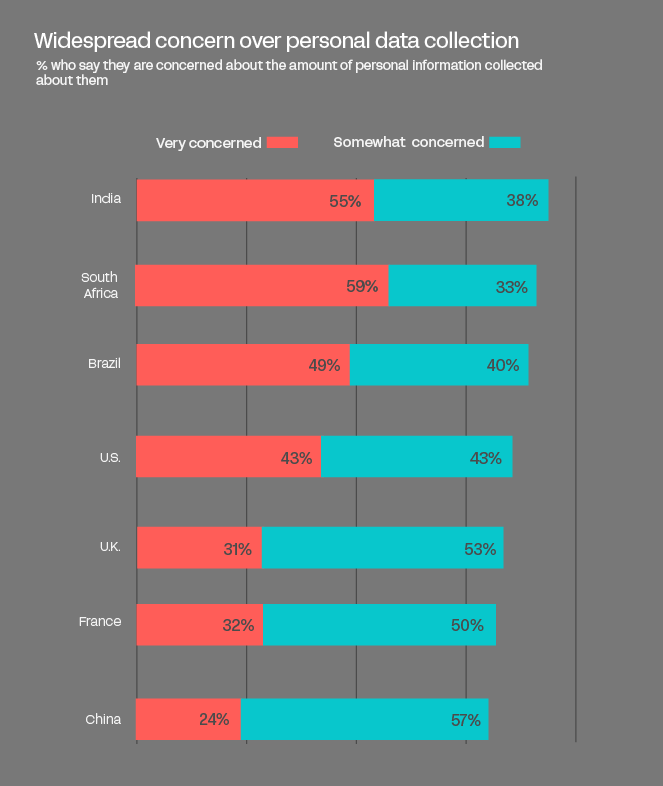
Many worried about companies collecting personal data
Majorities across the surveyed countries are concerned about the amount of personal information social media companies and internet businesses know about them. Worries are particularly pronounced in India (93%), South Africa (92%) and Brazil (89%), where roughly 9-in-10 are worried about the fate of their personal data. This includes approximately half or more in each country who say they are very concerned about the amount of data collected by social media and other online companies.
Worries about personal data are only slightly less widespread in the U.S. (86%), U.K. (84%), France. (82%) and China (81%). In the U.S., Americans are evenly divided between those who are very concerned and somewhat concerned (43%, each).
In most countries surveyed, respondents with higher levels of education tend to be less concerned about the amount of personal information collected by social media companies and internet businesses. This difference is most pronounced in South Africa and China. In South Africa, 62% of those with higher education express concern, compared to 86% of those with no formal education—a difference of 24 percentage points. In China, this gap is even larger: 25% of those with higher education were concerned, compared to 62% of those without formal education, representing a 37-point difference.
In the U.S. concern over the amount of personal information collected by social media and other online companies also varies by education level, although not as dramatically. Those with higher education levels are 10 percentage points more likely to worry about the collection of personal data than those with no formal education (46% vs. 36% “very concerned”).
In France, another advanced economy, concerns about the online collection of personal information do not vary substantially by education, while in the U.K, the relationship between concern and education points in the opposite direction: 43% of those without a formal education are very concerned about the collection of personal information, compared with 33% of those with higher education.
Few feel firmly in control of their personal data
Perhaps reflecting concerns about the amount of personal data that social media and online businesses collect about them, relatively few people across the countries polled feel firmly in control of their personal data. A median of just 18% say they have “a great deal” of control over their personal data. Far more describe their level of control as more modest (44% – “fair amount”) or even questionable (36% – “not very much” or no control).
Publics in India and China are the most upbeat about their ability to manage their personal information; however, even in these countries, fewer than half report feeling fully in control. In India, 40% of respondents believe they have a “great deal” of control over their data, compared to 25% in China. By contrast, significantly fewer respondents in South Africa (20%), Brazil (18%), the U.S. (18%), France (11%), and the U.K. (10%) feel they have a strong degree of control over the personal information that social media and online companies collect about them.
The perceived lack of control is characteristic of younger and older generations, alike. Across the surveyed countries, a median of just 1-in-4 (24%) among young adults describe themselves as exercising a “great deal of control” over their personal data. This is a higher share, however, than among older generations (14% “great deal of control”).
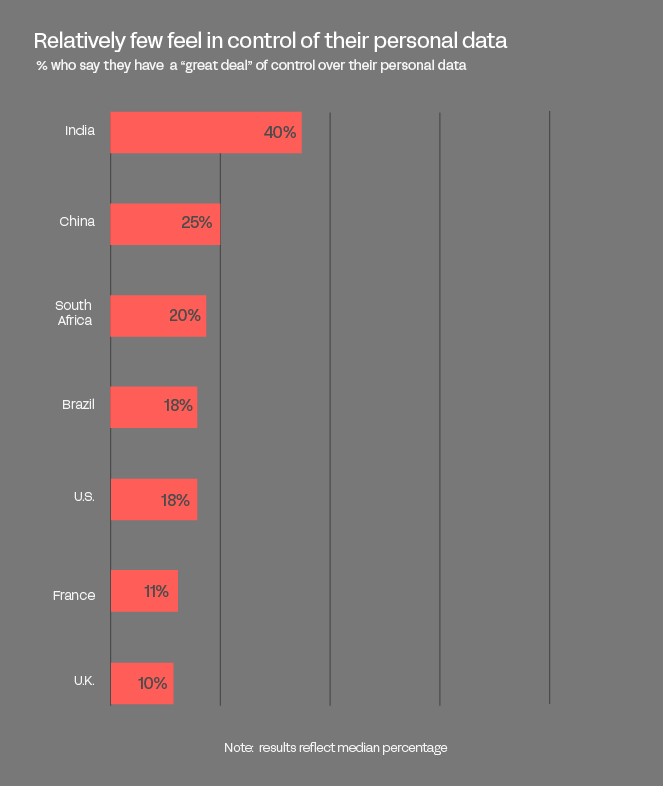
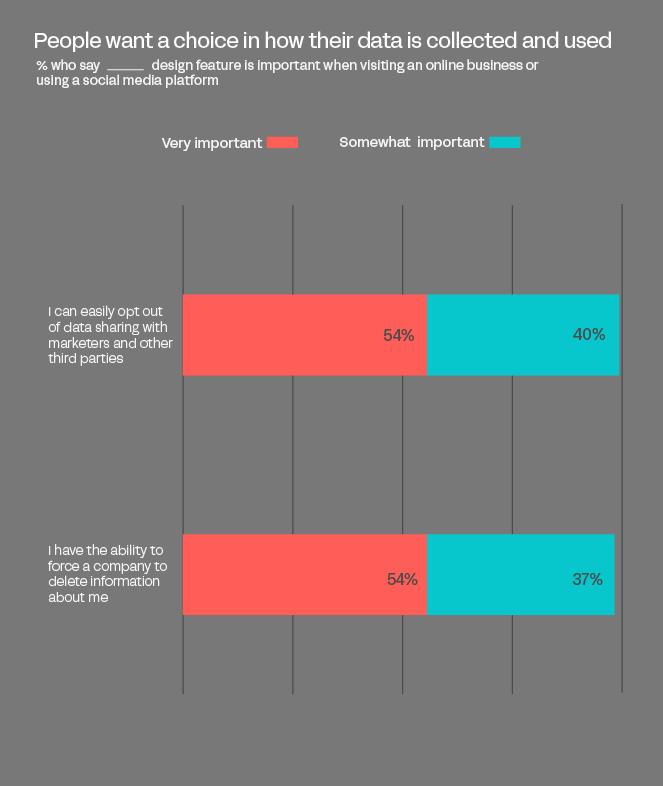
Strong desire for a choice in how data is collected
Overwhelming shares of those polled want a meaningful choice when it comes to how their personal data is collected and used. Asked about measures that could help safeguard the security and privacy of their data, medians of more than 9-in-10 say it is important to be able to opt-out of having their data shared with marketers or third parties (94%) and to be able to force companies to delete personal data, if requested (91%). This includes more than half (54%) who say each measure is very important.
At the country-level, too, there are high-levels of support for being able to choose not to have one’s personal information shared with marketers and third parties. In South Africa (67%), U.S. (58%), India (54%), Brazil (54%), and the U.K. (52%), majorities say that such an option is very important. The intensity of support for being able to force companies to delete personal data is similarly strong in South Africa (69% “very important”), U.S. (60%), the U.K. (58%) and Brazil (54%).
Across the countries surveyed, respondents with higher levels of education are more likely to describe the ability to force companies to delete their personal data as very important. The largest disparity appears in the U.S., where 63% of those with higher education view this feature as essential, compared to only 33% of respondents with no formal education—a difference of 30 percentage points. In other developed countries, such as France and the U.K., this gap is less pronounced, with differences of 16 points and 11 points, respectively. Educational differences are not closely linked to attitudes about not sharing data with marketers or third parties.
Data Transparency
In addition to direct control, majorities across the survey countries also value measures that improve their visibility into the personal data that social media and other online businesses are collecting about them and how this data is being used. There is near-universal agreement that it is important for companies to: commit to not selling personal data (94%), clearly state the terms and conditions governing the use of personal data (93%), make it possible for people to see all the data collected about them (92%), and frequently remind users about the personal data they have agreed to share (87%). As many as 6-in-10 say that corporate commitments to not sell personal data and to publish easily understood terms and conditions of data use are very important.
Half or more across all seven countries polled say it is very important that companies commit to not selling their personal data to marketers and third parties – including more than 6-in-10 in South Africa (76%), Brazil (68%), U.S. (62%) and U.K (62%) who share this view. Similar percentages in these countries also place a premium on companies clearly stating the terms and conditions of data use and being able to see all the personal information collected about them. Being frequently reminded about the data they have agreed to share is considered very important only in South Africa (63%) and India (53%).
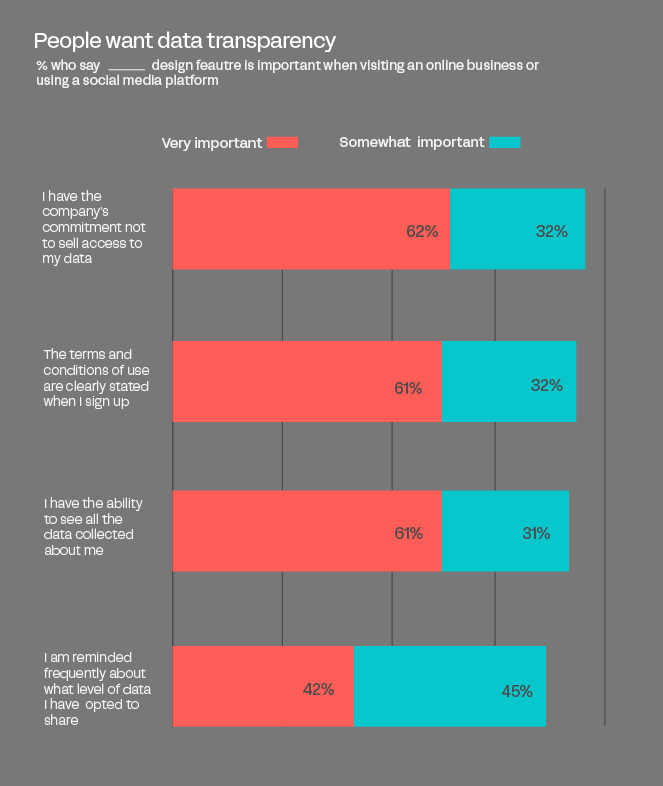
Across the developed economies polled – U.S., U.K., and France, those with higher levels of education consistently place greater importance on the design features presented in the survey. In the developing economies covered, the relationship between education level and support for data privacy protections is not consistent.
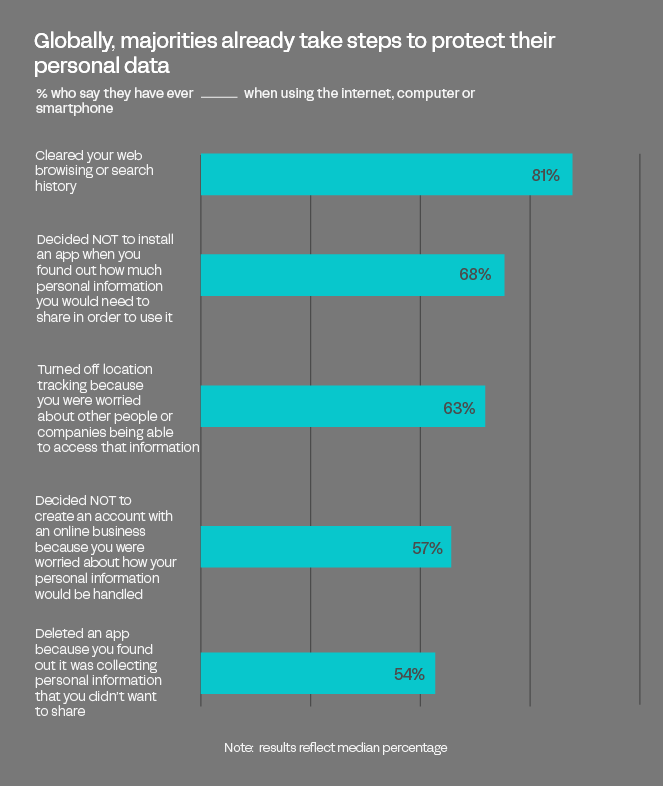
Many already take steps to keep personal data private
Although majorities would welcome rules and policies to improve their control over the collection and use of their personal data, substantial shares are not idly waiting for the arrival of such measures to protect their data. Some of the steps being taken are relatively basic, such as clearing one’s browser history (a median of 81% across all countries report doing this) or turning off location-tracking (63%).
But some involve more stark decisions, such as choosing to not install an app (median of 68%) or open an online account (57%) due to concerns about the personal data requested. Slightly fewer (54%) also report deleting an app after discovering it was collecting information they did not want to share.
Majorities of 6-in-10 or more in each of the countries polled claim they have said “no” to installing an app when they found out the kinds of personal data it would collect. Deciding not to install an app because of data privacy concerns is particularly common in South Africa (74%), Brazil (73%), China (72%) and the U.S. (68%).
Almost as many say they have similarly declined to open an online account once they realized the types of personal data that would be collected. Again, this is a prevalent story among Brazilians (71%) and South Africans (68%), with slightly fewer Americans (59%) and Indians (57%) stating the same.
Deleting an app due to data privacy concerns is less frequent than opting to not install an app in the first place, but more than half in India (65%), China (65%), South Africa (60%), U.S. (54%) and Brazil (54%) report taking this step. Fewer than half in France (47%) and U.K. (43%) say they have done the same.
While using a device or app, half or more in each country admit to disabling the location tracking feature due to worries about other people or companies surveilling them. This privacy-preserving action is particularly prevalent in the U.S. (67%), India (67%) and Brazil (67%). Smaller majorities report doing the same in France (63%), China (61%), U.K. (58%) and South Africa (55%).
And as mentioned above, clearing one’s browsing history is a widespread measure people say they have taken to keep data about their online activities private. The share who say they’ve removed their browsing history ranges from 86% in the U.S. to 72% in the U.K.
Texts, friends and location top list of sensitive data
People vary widely in how they rate the sensitivity of different types of personal information. Across the economies polled, majorities view the content of texts and emails (median of 60%), names of friends (57%), and geolocation (54%) as highly sensitive. A third or more say the same about their health status (44%), browsing history (41%) and birthdate (35%), while fewer place online searches (34%) and purchasing history in the same category (19%). Notably, outside of China, where the question was not asked, a median of just 28% consider their political views and vote choices to be very sensitive.
Clear majorities in South Africa (74%), U.K. (69%) and U.S. (68%) view the content of their texts and emails as highly sensitive. Smaller majorities share this assessment in India (60%), China (57%) and Brazil (53%). Only in France do fewer than half (46%) describe the content of their texts and emails as very sensitive.
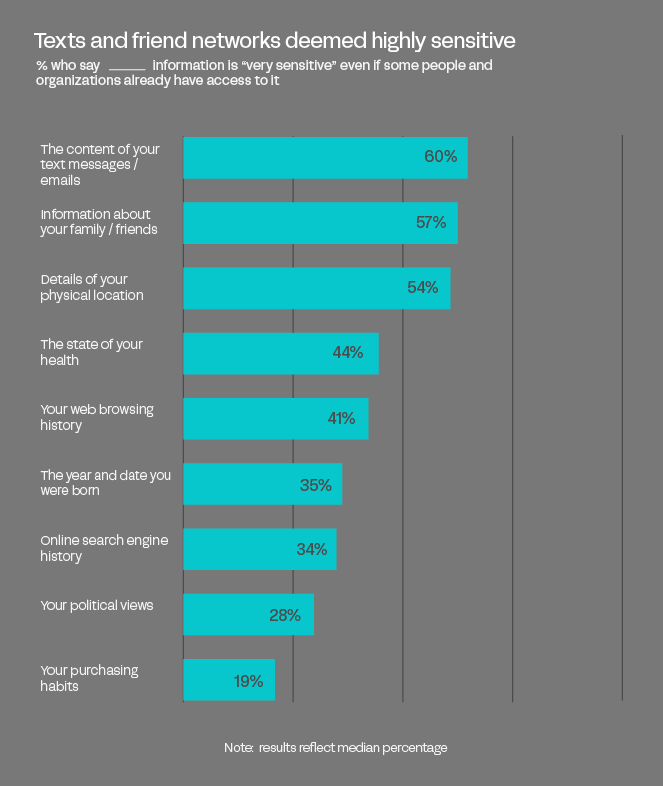
In most countries, geolocation data is also considered highly personal. Majorities in South Africa (75%), U.S. (63%), U.K. (56%) and India (54%) share this opinion, while slightly fewer in the same countries view their friend networks in the same light (South Africa – 70%; U.S. (62%), U.K. (61%) and India (57%). Names of friends is the only category of personal data asked about that a majority of Chinese (57%) describe as very sensitive.
Over half of South Africans (62%), Americans (56%) and Britons (52%) consider information about their health and medications to be very sensitive, while just over half of South Africans (52%) and Indians (52%) say the same about their browsing histories.
Fewer than half in any country describe online search histories, birth information or shopping histories to be highly sensitive. And, again, outside of China where the question was not asked, relatively modest shares – from 27% in U.K. and Brazil to 36% in India view their political views and candidate support as especially sensitive.
Methodology
Project Liberty Institute partnered with polling firm J.L. Partners conducted an international survey of 14,220 adults aged 18-74 years from October 11-20, 2023. Participants were recruited by Cint from online survey panel providers in seven countries: Brazil, China (mainland), France, India, South Africa, the United Kingdom, and the United States of America.
The survey comprised a minimum of 2,000 respondents in each country, with samples designed to ensure national representativeness across age, gender, and geographic region. Weighting adjustments were applied to align the final sample composition more closely with each country’s most recent census data.
The samples in the U.S., U.K. and France can be taken as representative of their general adult population under the age of 75. The samples in Brazil, mainland China, India and South Africa are more urban, more educated, and/or more affluent than the general population. The survey results for these countries should be viewed as reflecting the views of the more “connected” segment of the population.
Note: Percentages in the text and tables may not total 100% due to rounding.